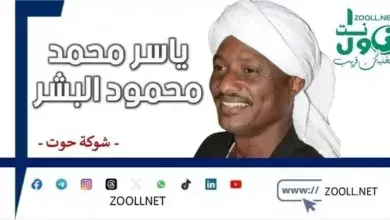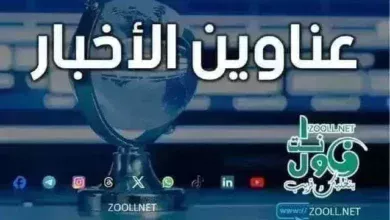Al-Kabli… and alienation is the hardest struggle – these are my visions – ✍️ Abdul Aziz Abdul Wahab

Al-Kabli.. registered brand (singing).. high quality; More and more refined… He is the only one among the few for whom it is necessary to hold the hand (eloquent/familiar vocabulary) or ask for help from a friend (teacher) in order to understand or translate part of the vocabulary of his songs extravagant, deeply eloquent or familiar.
He is an elite box office champion; He never went on stage towards the degraded and sick base: it's the public who wants him.
On the contrary, he always looked forward to singing or lecturing in abundant English or elegant Arabic to the elite of the people and the purest tastes, surprising them, entertaining them and filling them with perfect health.
Its melodies flow; A subtle dew, so that it settles there among those who have the sixth sense and above, so that it is as if you were drunk and you are not drunk; Here he was influenced by the intellectual wealth enjoyed by his father, as he knew some of Shakespeare's works by heart.
Its preamble says that he was born in Port Sudan in 1932 AD. He has roots dating back to the Afghan city of Kabul in the family of his father, Abdul Aziz Muhammad al-Kabli, and origins dating back to Mecca and then Morocco and Sudan. He moved between Gedaref, Qalabat and Kassala. the family of his mother, Mrs. Safiya al-Sharif Ahmed Muhammad Nour Zarrouk, founder of the Koranic Cells.
Al-Kabli studied and graduated from Omdurman Secondary Commerce College and worked as an administrative inspector in the judicial authority until he reached the position of chief inspector of courts.
His first creative production, written and composed, was the song (Ya Zahia), which he dedicated to the artist Abdel Aziz Muhammad Daoud, king and discoverer of the Orchestra (Sulfre).
He then began to build his artistic and aesthetic project to realize his own vision, which is to enrich Sudanese and Arab consciousness, leading it to the desired creative and behavioral pruning and refinement.
This is what he expressed in his interviews with BBC Radio and in his book (Melodies, Not Mines), published in the United States. The Universities of Sudan in 2007 and Nyala in 2002 awarded him an honorary doctorate in literature in recognition of his abundant efforts in documentation in the fields of Arabic literature and Sudanese heritage.
Al-Kabli was not just an artist; Rather, it is a collection of exquisite fragrances expressed in an enlightened melody that flows through you until it uplifts and possesses you. It contains a rose of the rose, a whiff of the Bashkatib, a song of the brigadier, a song of Uthman Hussein. clue, and the whale is strongly present there.
He sings his powerful voice over the ten layers of melodies… then rises and falls in perfect harmony and harmony.
And the cable; He still has difficult choices to impose on others. He opened the Diwan of the Arabs and recovered the precious pearls. I see you, the crying sticks of Abu Firas Al-Hamdani.. and it rained pearls (which she received) for Yazid bin Muawiyah.
It almost looks like it was sent during the time of Harun al-Rashid. He roamed the corridors of his high-ranking council with his melodious voice, frequented only by the intelligent and the brilliant. Who has a new Aaron to bring our knight to his status, for which he has qualified with all merit and abundance?
But he was not surpassed by medals and high medals. Algeria, which glorified its revolution and the struggle of its people, honored him with the mujahideen scarf. Which President Abdelaziz Bouteflika led during the Algiers Festival, capital of Arab culture, and the United Nations chose him as ambassador for humanity.
President Abdel Nasser also shook his hand during his visit to Khartoum in 1960 AD. . He performed the masterpiece Taj Al-Sir Al-Hassan (Asia and Africa) before him… Umm Kulthum praised him for his uniqueness and free singing during his visit to Sudan in 67 AD .
You will not be surprised when you see Al-Kabli crossing the paths, heading towards the house of Jaal and those around him, drinking the morning coffee of Bakri and Al-Tani in the presence of Mak Nimr, and following the rhythm . the knights and tribal leaders in their debates and poetic debates. He brings out masterpieces similar to them, masterpieces such as: What is the Fafnus of Banunah bint Mak Nimr? Ali (Fartiqa or Labous), Fatna's maternal uncle, Al-Dud Qarqar and Al-Hassan Saqi'a Al-Najm.
Al-Kabli enjoyed a clear Sufi sense. He led us to the heights with the song “Lailat al-Mawlid” by Majzoub and “Praise to the Lord of the Servants” (written by him) and “Jadd Wa Dhuka” by Sheikh Al-Borai, who often sang in his private life the masterpiece of Kabli Shatha Zahr.
Our hero is one of the pioneers who enriched the library of Sudanese songs in terms of composition and composition. Among the writings of the poet Al-Kabli are: Zeina and Ajabani.. Sugar Sugar.. The girl of today and tomorrow.. The Palestinian anthem.. Oh Moon of Doreen.. Oh Hajar.. You were at a party one night.. Your love for people and there is nothing surprising in that.
He also dedicated some of his works to his fellow creators, including “Marsal Al-Shuq” from “Arkki”, “Baridak” and “Al-Raida, Zahra fi Ayni Tarbas”.
Kabli did not care about politics and was not active in it, although he spoke of being a Nasserite fanatic. Rather, his masterpieces appeared in song for the great nation and its men whose paths were not scratched. regional liberation movements.
He immigrated to Saudi Arabia in 78 AD and returned in 81 AD and said at the time: How can I be happy when the people around me are hungry? So here he is leaving for a long journey to America… Will someone who deserves the distinction of what we call (the first Arab artist) return? .
Yes, the Saudi Muhammad Abdo, who is (exaggeratedly) called the artist of the Arabs, will not be able to compete with or follow Al-Kabli. Otherwise, let him publish his book and let's see.
I swear to you, Hamdok.
Take a look at the cable problem:
Come back and come to the top…
Because this man, frankly, is the prince of me and my big heart
**We are republishing it on the third anniversary of the death of the creator, the symbol on whose tomb is Shabib, mercy and forgiveness.




